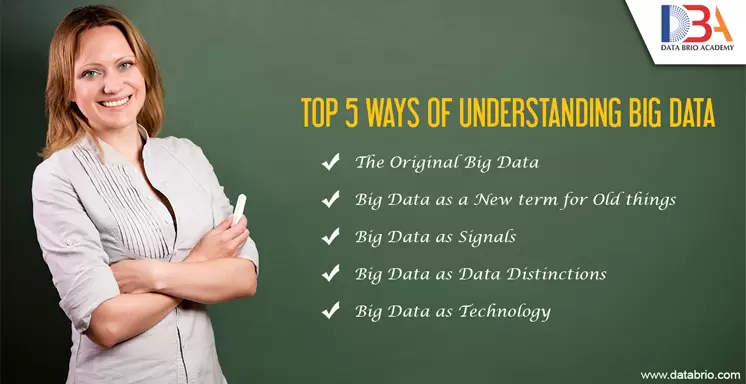If you are interested in Big Data, by now you must understand that big data is not at all about More Data. Here in this blog post, we are going to discuss top 5 ways of understanding big data.
- The original Big Data: We don’t mean authentic or correct by the original. We actually mean the first ever definition composed twelve years ago by Doug Laney. Big data is viewed by this definition as the 3 Vs: Variety, Velocity, and Volume. Since then, individuals have been including their own Vs: Validity, Visibility, Veracity, and Value.
- Big Data as a new term for old things: This is the most cynical and laziest use of the term, where projects which were probably to use earlier technology and would have been called Business Intelligence or Business Analytics in the past, have suddenly recalled in a justly obvious effort for leaping on the big data trend.
- Big Data as signals: As the data set types, big data was not enough for business. By the time, the recording of these transactions is done, and it’s very late for doing anything regarding them: organizations are continuously handling out of the rear-view mirror. Organizations can rather use new signal data in the new world for predicting what will happen and interfering for improving the situation. Instances include predictive maintenance and tracking brand sentiment on social media.
- Big data as data distinctions: The issue with big data as technology is that 1) everyone knew that they were supposed to raise the argument and discuss something more useful stuff about business and 2) it’s unclear enough that all vendors in the industry leaped in for claiming it for them. There was a division made, the data produced by a human is also called transactional data which was machine generated and recorded data. This helped businesses understand their big data in the business context.
- Big data as technology: The purpose that big data has presently taken the spotlight, twelve years later is because of the growth of open source technologies like NoSQL, Hadoop etc. These new tools’ users required a term which separated them from earlier technologies, and anyhow finished up settling on the extremely insufficient term Big Data. If anyhow you go to a Big Data conference, then you can be guaranteed that sessions highlighting relational databases – no matter how many Vs they sport – will not be in the majority.
At Data Brio Academy, we give candidates proper understanding of big data by conducting big data courses. So, contact us today if you are a big data enthusiast.

